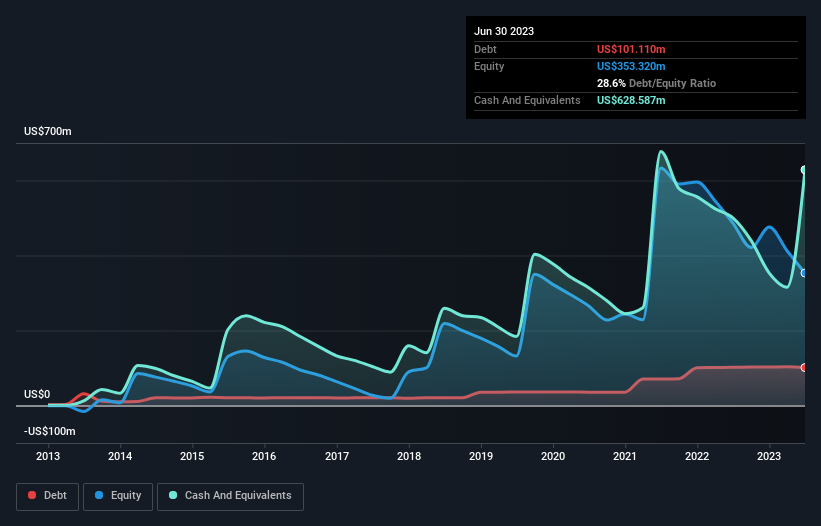- United States
- /
- Biotech
- /
- NasdaqGS:QURE
Here's Why uniQure (NASDAQ:QURE) Can Manage Its Debt Despite Losing Money

Legendary fund manager Li Lu (who Charlie Munger backed) once said, 'The biggest investment risk is not the volatility of prices, but whether you will suffer a permanent loss of capital.' So it might be obvious that you need to consider debt, when you think about how risky any given stock is, because too much debt can sink a company. Importantly, uniQure N.V. (NASDAQ:QURE) does carry debt. But should shareholders be worried about its use of debt?
When Is Debt Dangerous?
Debt assists a business until the business has trouble paying it off, either with new capital or with free cash flow. In the worst case scenario, a company can go bankrupt if it cannot pay its creditors. While that is not too common, we often do see indebted companies permanently diluting shareholders because lenders force them to raise capital at a distressed price. By replacing dilution, though, debt can be an extremely good tool for businesses that need capital to invest in growth at high rates of return. When we examine debt levels, we first consider both cash and debt levels, together.
Check out our latest analysis for uniQure
What Is uniQure's Debt?
As you can see below, uniQure had US$101.1m of debt, at June 2023, which is about the same as the year before. You can click the chart for greater detail. However, it does have US$628.6m in cash offsetting this, leading to net cash of US$527.5m.

How Strong Is uniQure's Balance Sheet?
Zooming in on the latest balance sheet data, we can see that uniQure had liabilities of US$68.4m due within 12 months and liabilities of US$521.1m due beyond that. On the other hand, it had cash of US$628.6m and US$102.6m worth of receivables due within a year. So it actually has US$141.7m more liquid assets than total liabilities.
It's good to see that uniQure has plenty of liquidity on its balance sheet, suggesting conservative management of liabilities. Because it has plenty of assets, it is unlikely to have trouble with its lenders. Succinctly put, uniQure boasts net cash, so it's fair to say it does not have a heavy debt load! When analysing debt levels, the balance sheet is the obvious place to start. But it is future earnings, more than anything, that will determine uniQure's ability to maintain a healthy balance sheet going forward. So if you're focused on the future you can check out this free report showing analyst profit forecasts.
In the last year uniQure wasn't profitable at an EBIT level, but managed to grow its revenue by 81%, to US$112m. Shareholders probably have their fingers crossed that it can grow its way to profits.
So How Risky Is uniQure?
Statistically speaking companies that lose money are riskier than those that make money. And we do note that uniQure had an earnings before interest and tax (EBIT) loss, over the last year. And over the same period it saw negative free cash outflow of US$251m and booked a US$187m accounting loss. But the saving grace is the US$527.5m on the balance sheet. That kitty means the company can keep spending for growth for at least two years, at current rates. uniQure's revenue growth shone bright over the last year, so it may well be in a position to turn a profit in due course. By investing before those profits, shareholders take on more risk in the hope of bigger rewards. The balance sheet is clearly the area to focus on when you are analysing debt. But ultimately, every company can contain risks that exist outside of the balance sheet. We've identified 4 warning signs with uniQure , and understanding them should be part of your investment process.
At the end of the day, it's often better to focus on companies that are free from net debt. You can access our special list of such companies (all with a track record of profit growth). It's free.
Valuation is complex, but we're here to simplify it.
Discover if uniQure might be undervalued or overvalued with our detailed analysis, featuring fair value estimates, potential risks, dividends, insider trades, and its financial condition.
Access Free AnalysisHave feedback on this article? Concerned about the content? Get in touch with us directly. Alternatively, email editorial-team (at) simplywallst.com.
This article by Simply Wall St is general in nature. We provide commentary based on historical data and analyst forecasts only using an unbiased methodology and our articles are not intended to be financial advice. It does not constitute a recommendation to buy or sell any stock, and does not take account of your objectives, or your financial situation. We aim to bring you long-term focused analysis driven by fundamental data. Note that our analysis may not factor in the latest price-sensitive company announcements or qualitative material. Simply Wall St has no position in any stocks mentioned.
About NasdaqGS:QURE
uniQure
Develops treatments for patients suffering from rare and other devastating diseases in the United States.
Slight and slightly overvalued.
Similar Companies
Market Insights
Community Narratives



